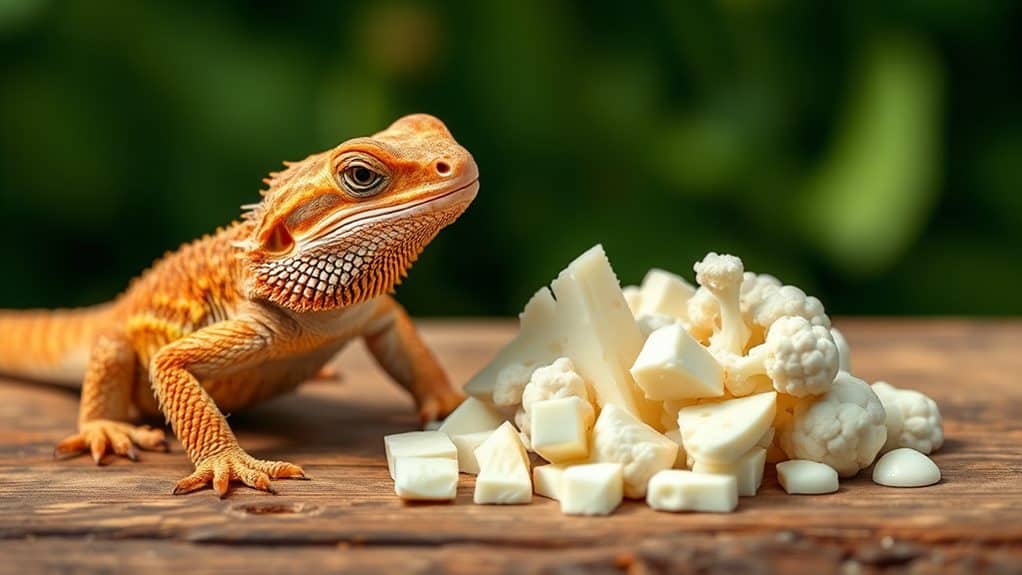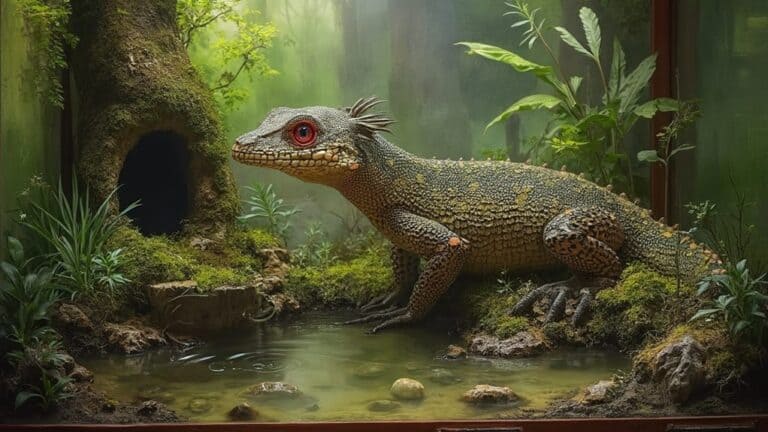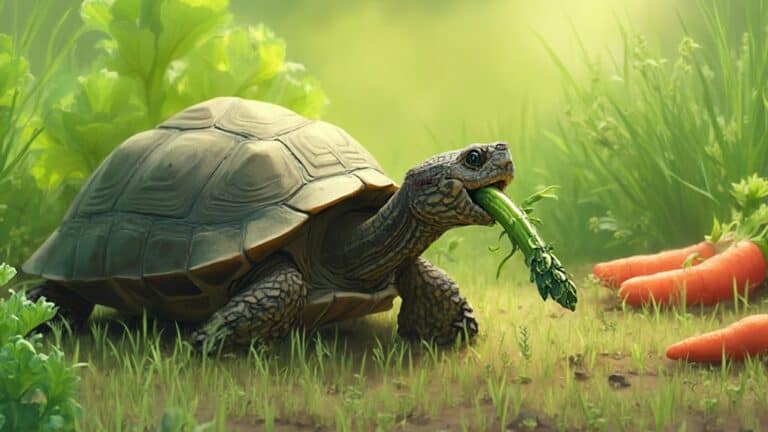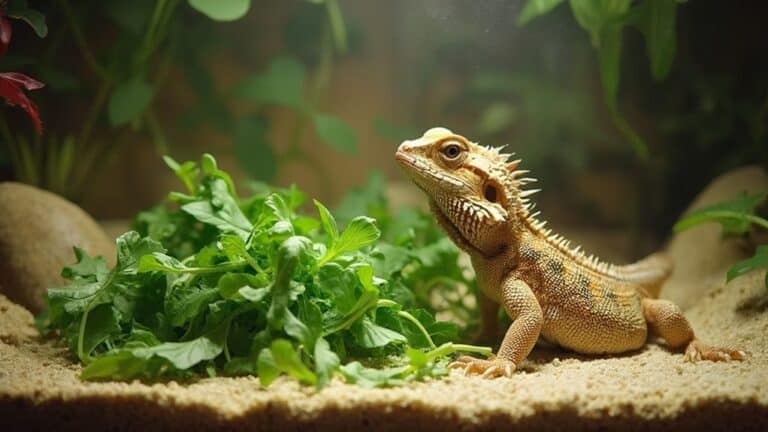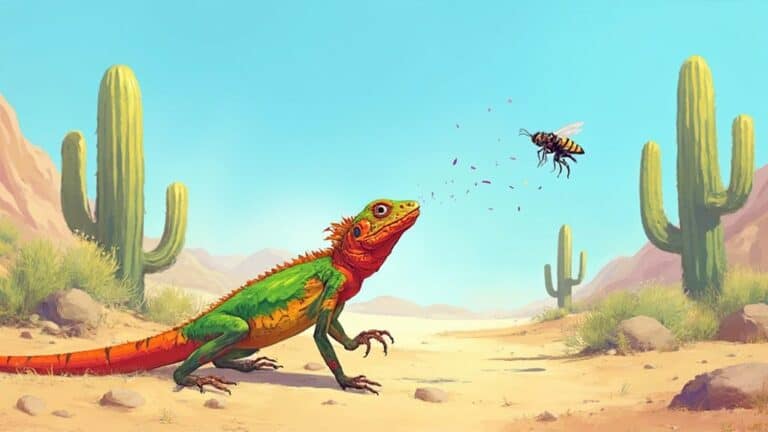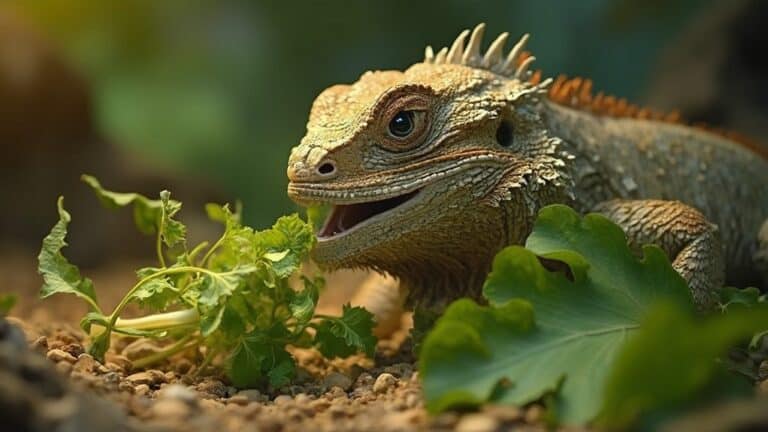Can a Bearded Dragon Eat Cauliflower
Yes, a bearded dragon can eat cauliflower, but it’s crucial to serve it in moderation due to its nutritional profile. Cauliflower contains a high level of phosphorus compared to calcium, which can hinder calcium absorption and lead to health issues. It’s also packed with vitamin C and K but offers a less favorable calcium to phosphorus ratio, making occasional small servings ideal. To reduce any potential risks, focus on feeding the leaves rather than the florets, as they present a more suitable calcium-to-phosphorus ratio. There’s much to evaluate about balancing their diet to promote health and well-being.
Key Takeaways
- Bearded dragons can eat cauliflower occasionally, but it should not be a regular part of their diet.
- High phosphorus content in cauliflower can lead to calcium deficiency in bearded dragons.
- Cauliflower contains goitrogens, which may impair thyroid function if fed frequently.
- Cauliflower leaves are a safer option due to their higher calcium and lower phosphorus levels.
- Limit cauliflower intake to 6-10 grams per month for adult bearded dragons to avoid health risks.
Table of Contents
Nutritional Content of Cauliflower
Packed with important nutrients, cauliflower offers notable health benefits for bearded dragons. As a responsible pet owner, you’re certainly keen to optimize your bearded dragon’s diet, and understanding the nutritional content of cauliflower can guide your decisions. This vegetable is rich in vitamin C and vitamin K, essential for your pet’s overall health. Vitamin C, in particular, is a powerful antioxidant that supports immune function.
However, when considering cauliflower for your bearded dragon, it’s important to look at the calcium to phosphorus ratio. Ideally, their diet should have more calcium than phosphorus to prevent metabolic bone disease. Unfortunately, cauliflower presents a challenge here; it contains calcium, but its phosphorus content is twice as high. This imbalance can be detrimental unless managed carefully.
Fortunately, the leaves of the cauliflower are a game-changer. They offer higher calcium and lower phosphorus levels compared to the cauliflower head, aligning better with nutritional needs. Additionally, the high water content in cauliflower aids in hydration, a critical aspect of health, while dietary fiber supports digestive health. Including cauliflower, particularly the leaves, can be beneficial if balanced correctly within the overall diet framework.
Safety for Bearded Dragons
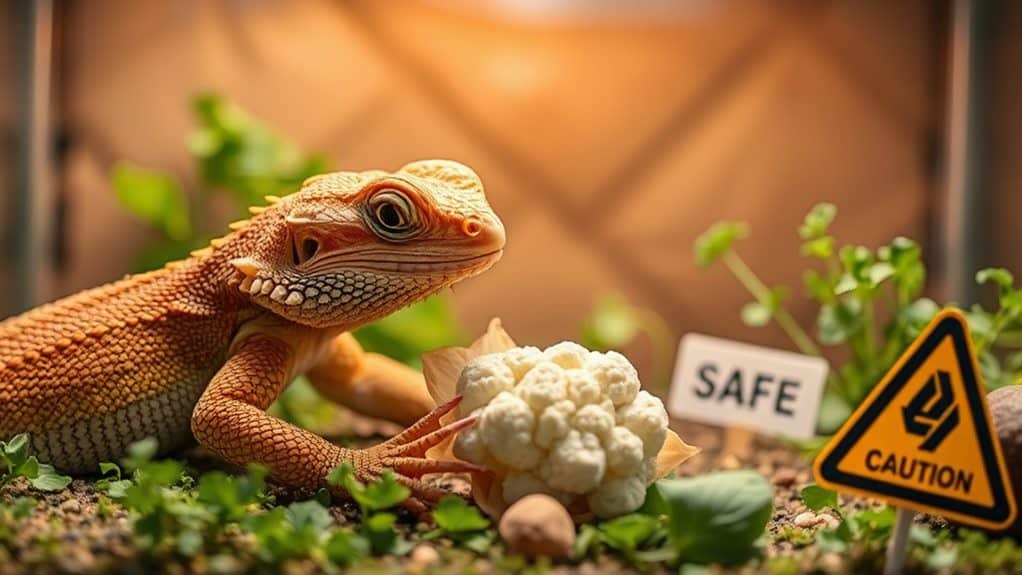
While a few nibbles of cauliflower are safe for your bearded dragon, it’s essential not to make it a regular part of their diet. Given the high phosphorus content, frequent feeding can disrupt the vital calcium balance in your pet, leading to calcium deficiency. This imbalance is a direct pathway to metabolic bone disease, a serious condition manifesting as weakened bones and potential deformity.
Moreover, the goitrogenic properties of cauliflower can impair thyroid function. Regular consumption, especially in large amounts, might hinder your bearded dragon’s thyroid, which is pivotal for regulating their metabolism and overall health. That’s why it’s important to take these aspects into account when you think about letting your bearded dragons eat cauliflower.
Additionally, always wash cauliflower thoroughly to eliminate any pesticides that could harm your pet. These chemicals are not just superficial; they permeate and can pose significant health risks if ingested.
If you’re looking to include cauliflower in your bearded dragon’s diet, opt for cauliflower leaves instead of the florets. These leaves have a more favorable calcium to phosphorus ratio, making them a safer choice for an occasional treat within a healthy diet.
Community Discussion Insights

Reflecting on the safety considerations associated with feeding cauliflower to bearded dragons, it is important to highlight the diverse perspectives within the community on this topic. From my engagement in various forums and discussions, it’s clear that the debate centers on the nutritional value and potential health risks of incorporating cauliflower into a bearded dragon’s diet.
Many experienced owners and reptile enthusiasts advocate for using cauliflower only in moderate amounts, citing its high phosphorus content which can disrupt the calcium balance critical for a bearded dragon’s bone health. The presence of goitrogens in cauliflower, which can potentially affect thyroid function, also fuels the argument to avoid feeding your bearded dragon this vegetable frequently.
Instead, the community often recommends opting for more nutritionally beneficial greens like dandelion greens, which are richer in calcium and lower in harmful compounds. This alternative not only supports the dietary needs of bearded dragons but also aligns with a commitment to providing the best care and ensuring the longevity and health of these pets. Instead, the community often recommends opting for more nutritionally beneficial greens like dandelion greens, which are richer in calcium and lower in harmful compounds. This alternative not only supports the dietary needs of bearded dragons but also aligns with a commitment to providing the best care and ensuring the longevity and health of these pets. Many owners also consider a variety of other safe and nutrient-dense choices, such as bearded dragons and turnip greens, to ensure a well-rounded diet. Incorporating these options into their meals can help maintain a proper calcium-to-phosphorus ratio, which is crucial for preventing metabolic bone disease.
The consensus suggests that while an occasional cauliflower treat is not harmful, focusing on a diet that includes safer and more nutrient-dense options is ideal for maintaining the health of your bearded dragon.
Information Sources and Attribution
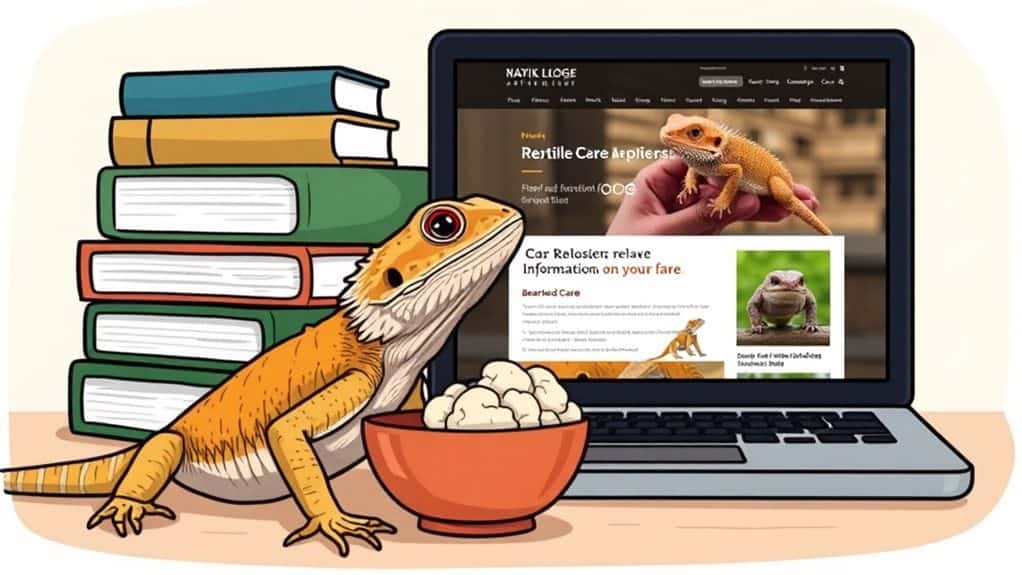
Accuracy in providing dietary advice for bearded dragons is paramount, and I rely on a variety of authoritative sources to guarantee the information I share is both precise and reliable. When discussing whether you can feed your bearded dragon cauliflower, it’s crucial to evaluate the nutritional ratio, particularly the calcium content and the presence of goitrogens, which can affect thyroid function in reptiles.
Veterinary guidelines and reptile care books are foundational in forming my recommendations. These sources are peer-reviewed and compiled by experts in reptilian biology, ensuring that the dietary needs and potential risks for bearded dragons are well-documented. Additionally, the USDA National Nutrient Database offers detailed breakdowns of cauliflower’s nutritional profile, helping to assess its suitability and safety in your beardie’s diet.
For real-world application, insights from experienced owners on forums like Reddit or specialized reptile care platforms provide a practical perspective on feeding practices. These community sources complement scientific data by sharing personal experiences on how bearded dragons react to different foods, including cauliflower and staples like collard greens.
Citing these varied sources helps me deliver advice that’s not only scientifically accurate but also enriched with practical wisdom, ensuring you can safely and effectively feed your beardie.
General Care for Bearded Dragons
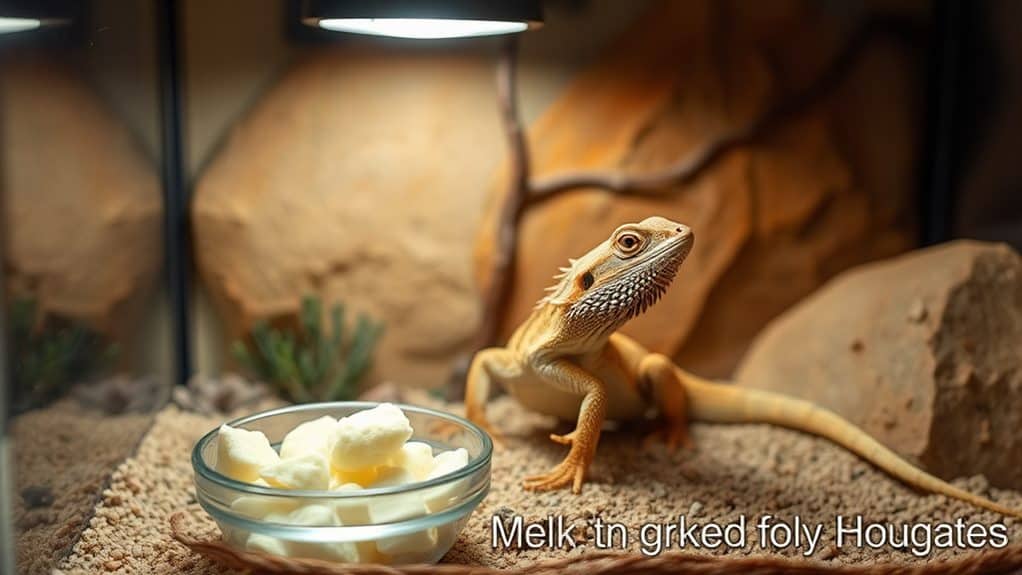
Many aspects of bearded dragon care are essential, but providing a varied diet rich in vegetables tops the list for maintaining their health and nutrition. When caring for your bearded dragon, ensuring they receive dark leafy greens is important due to their high nutritional content and favorable calcium ratio. These greens not only offer significant nutrients but also help prevent common health issues like metabolic bone disease.
Proper habitat setup is another cornerstone of bearded dragon care. They require specific UVB lighting to effectively metabolize calcium. Without this, even a diet high in calcium can fail to prevent health problems. Regular health check-ups and weight monitoring are indispensable to catch any signs of illness early. I can’t stress enough the importance of continuous education on the dietary needs and overall health management of your pet.
Here’s a quick reference table to help you better understand the dietary balance:
| Food Type | Benefits |
|---|---|
| Dark Leafy Greens | High in Vitamin K, Calcium |
| Protein Sources | Necessary for growth |
| Small Amounts of Fruits | Occasional treats |
Feeding your bearded dragon involves more than just knowing what bearded dragons can eat; it’s about creating a balanced diet that fulfills all their nutritional needs.
Cauliflower in Bearded Dragon Diets
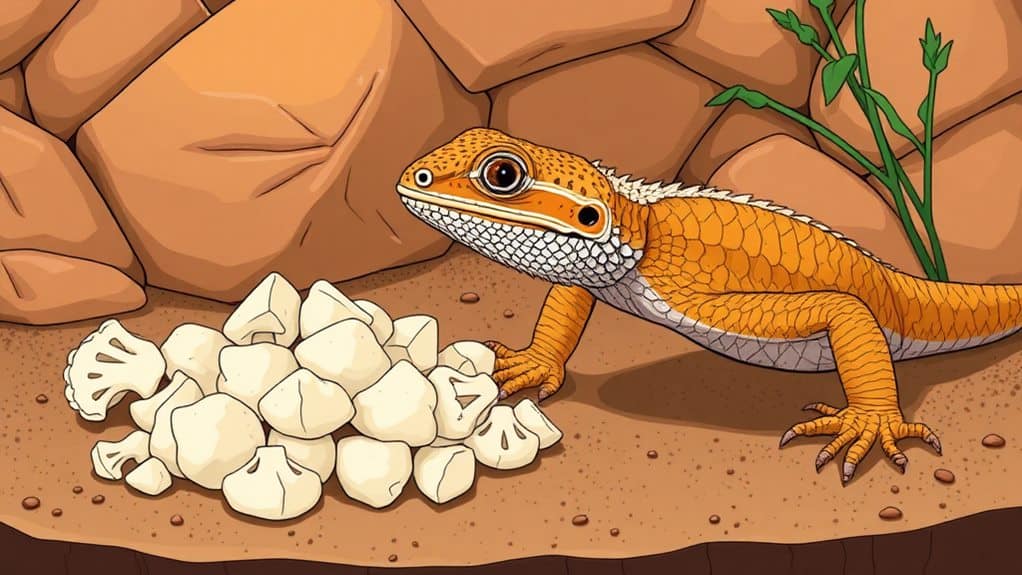
Incorporating cauliflower into your bearded dragon’s diet requires careful consideration due to its nutritional profile. While not toxic, the vegetable’s calcium to phosphorus ratio is significantly less than ideal, which is an essential aspect to monitor for maintaining your pet’s health. Specifically, cauliflower contains 22 mg of calcium to 44 mg of phosphorus per 100g. This imbalance can contribute to metabolic bone disease, a common issue in captive dragons, if it becomes a staple rather than an occasional treat.
Bearded dragons need a balanced diet where leafy greens and appropriate protein sources take precedence. Given its high phosphorus content, the recommended intake of cauliflower should be limited to about 6-10 grams per month for adult dragons, with even lesser amounts for juveniles to align with their specific nutritional needs.
Interestingly, the leaves of the cauliflower are often overlooked but can be a healthier choice. They are higher in calcium and lower in harmful goitrogens compared to the cauliflower head. Including these greens occasionally can enrich your dragon’s diet without the risks associated with the floral parts. Always aim for a variety that supports the overall health of your bearded dragon, ensuring they receive all the necessary nutrients in correct proportions.
Alternative Vegetable Recommendations
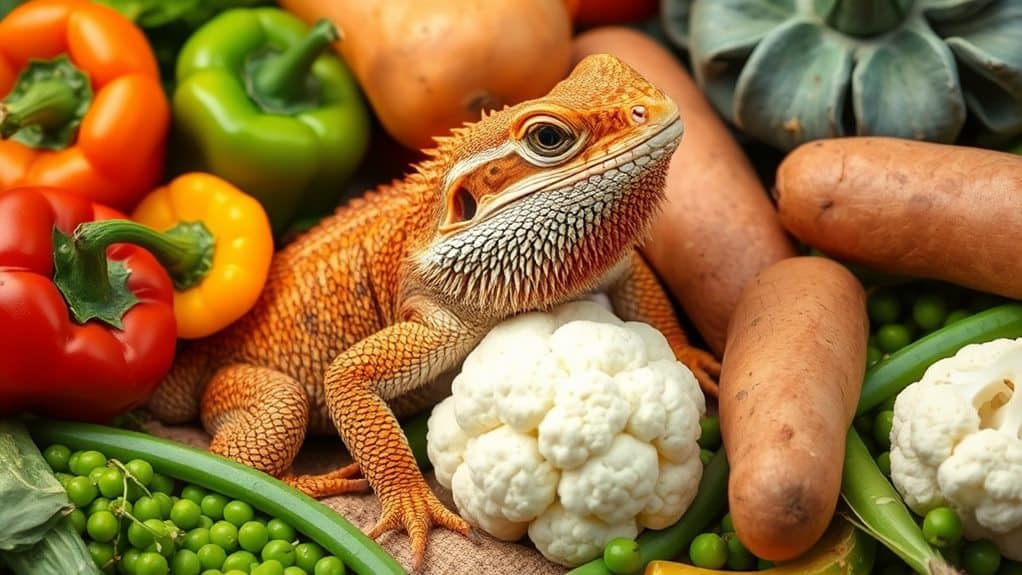
Let’s explore some excellent vegetable alternatives that are healthier for your bearded dragon than cauliflower. While cauliflower isn’t harmful, other vegetables offer superior nutritional benefits that are essential for your pet’s health and well-being.
Here are a few top choices:
- Dandelion Greens: These leafy vegetables are a powerhouse of nutrition, boasting a high calcium content which is crucial for bone health. Their favorable calcium-to-phosphorus ratio makes them an ideal regular inclusion in your bearded dragon’s diet.
- Mustard Greens: Another excellent choice, mustard greens provide important vitamins and minerals, supporting overall health. They are especially low in phosphorus, which is beneficial as high phosphorus can interfere with calcium absorption.
- Bell Peppers: Available in various colors, bell peppers can brighten your pet’s diet while offering a mix of vitamins and antioxidants. They’re also low in calories, making them a good choice for maintaining a healthy weight.
Additionally, consider integrating bok choy and acorn squash into the feeding schedule. Bok choy is rich in vitamins and has a low oxalate content, which helps in better calcium absorption, while acorn squash contributes valuable fiber and vitamins A and C. Together, these vegetables guarantee a balanced diet, steering clear of the nutritional limitations of cauliflower.
Conclusion
In wrapping up, while cauliflower isn’t the crown jewel in a bearded dragon’s diet, it can be fed occasionally in small amounts. Remember, moderation is key to avoid any digestive upsets. For a thriving pet, diversify with safer, nutrient-rich veggies like squash and greens. Always consult with a vet to tailor the diet to your dragon’s needs, ensuring your scaly friend enjoys a long, healthy life under your watchful care.

